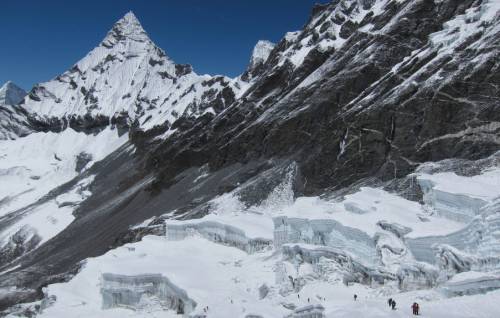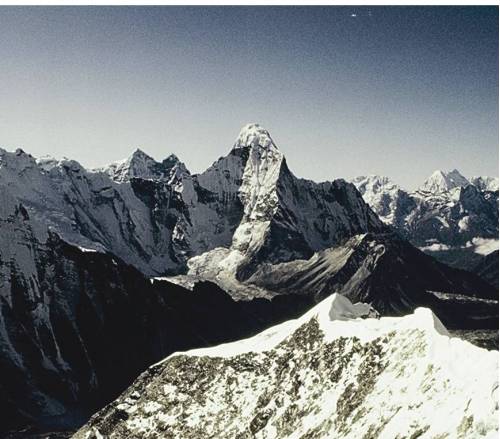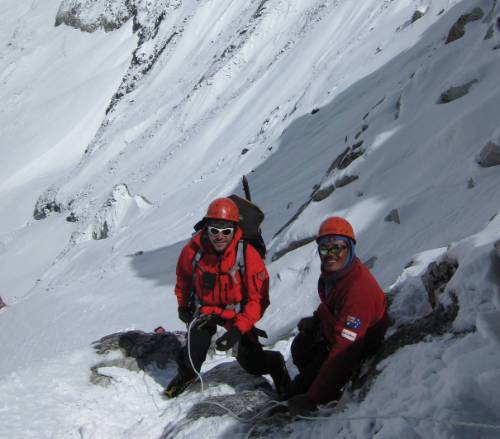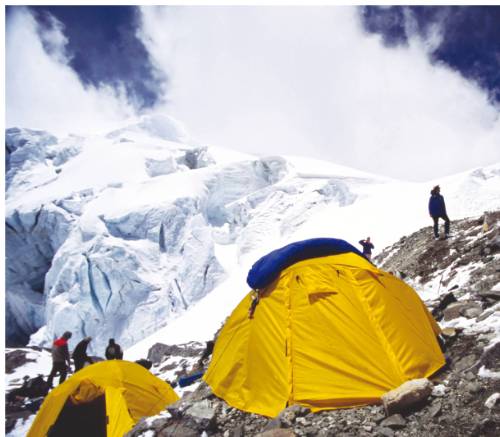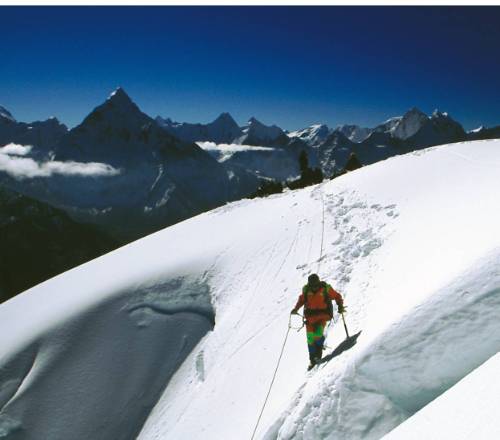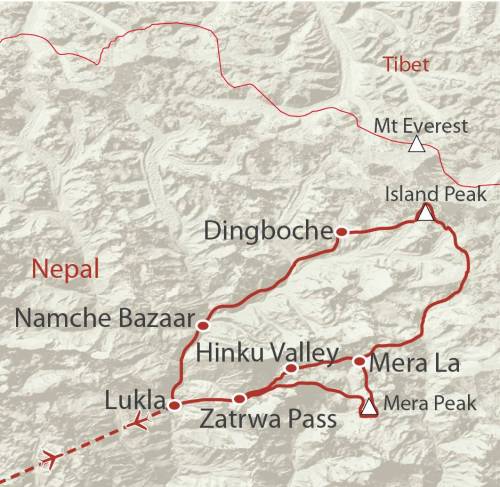Mera & Island Peak via Amphu Labsta
Mera & Island Peak via Amphu Labsta
$6500
Mera & Island Peak via Amphu Labsta
30 Days Starting in Kathmandu and ending in Kathmandu, Nepal
Visiting: Kathmandu, Lukla, Pangom, Hinku Valley, Chalem Kharka, Panch Pokhari, Chunbu Kharka, Tagnag, Sabai Tsho, Mera Peak, Khumbu Valley, Honku Valley, Khumbu, Island Peak, Namche Bazaar
Tour operator:
Tour code:
MPI
Guide Type:
Fully Guided
Group size:
8 - 12
Trip Styles:
Activities:
Tour Overview
Embark on an exhilarating adventure with the Mera & Island Peak via Amphu Labsta expedition in Nepal. This fully supported journey, led by expert climbing guides, offers the chance to conquer two of Nepal's iconic trekking peaks: Mera (6476m) and Island Peak (6189m). Experience the thrill of crossing the technical Amphu Laptsa Pass at 5845m, while enjoying the warm hospitality of the Sherpa culture. The expedition includes a stunning Himalayan flight from Ramechap to Lukla and a trek through the traditional Sherpa villages of Solu Khumbu and the Hinku Valley. With a 1:3 climbing Sherpa to climber ratio, ample acclimatization, and a generous summit window, this adventure ensures a supportive and rewarding experience. Enjoy the breathtaking views, the camaraderie of fellow adventurers, and the satisfaction of reaching new heights in the majestic Himalayas.
Highlights
Itinerary
Day 1 : Join Kathmandu
Location: Kathmandu
Accommodation Name: Radisson Hotel
Meals Included: Dinner
You will be met by a representative of World Expeditions and transferred to the Radisson hotel. Remainder of the afternoon at leisure. A pre-trek briefing will be given around 4.30-5pm where arrangements will be made for the distribution of your kit bag, sleeping bag and down/fibrefill jacket. This evening we will head out for dinner, this is a great opportunity to get acquainted with your fellow group members.Overnight: Radisson Hotel
Day 2 : Gear Check And Free Day In Kathmandu Or Drive To Ramechap (Approx 5 Hours)
Location: Kathmandu
Accommodation Name: Radisson Hotel or private eco-camp
This morning final gear checks will be held and afterwards we will depart for Thamelwhere any necessary items will be hired, ie plastic boots, or purchased. After the gear check has been completed, you will either have a free day to explore Kathmandu or depending on the season, depart for Ramechap, a small town that operates flights to Lukla, the gateway of trekking in the Khumbu region. Our campsite will be in close proximity to the runway for our early morning flight to Lukla.Overnight: Radisson Hotel or private eco-camp *NB: Domestic flights to/from Lukla during Spring and Autumn trekking seasons (March-May and October-December) may operate from Manthali Airport, Ramechap. This is determined by the Civil Aviation Authority of Nepal and dates are subject to change. Your leader will brief you on flight arrangements locally.
Day 3 : Fly To Lukla (2800M) & Commence Trekking To Puiyan (Approx 2800M)
Location: Lukla
An early start to the airport to catch the 45 minute flight to the STOL airstrip at Lukla. It is a memorable flight, with marvelous views of the Eastern Himalaya. Our crew and porters assemble, loads are sorted and after a cup of tea, we are soon on our way down a trail below the air strip to the river at Surke Khola, which brings us adjacent to the racing glacial waters of the Dudh Kosi. Our route takes a southerly direction along old trade routes, a trail of farm settlements growing subsistence crops such as millet, corn and buckwheat and then as we trek higher, into stands of oaks, maple and rhododendron.
Day 4 : Trek To Pangom (2800M)
Location: Pangom
We follow the main trail briefly before turning up a path that leads into the forest and traverses around many ridges to the valley of the Kari Khola. Although our camp elevations are similar for the last days, we are undulating over two major ridges, the Chutok La (2945m) and the Khari La (3080m). As we approach Pangum, set in the base of a small bowl like valley immediately below the Pangum La, we travel through forests of rhododendron, pines and oaks. This is a little known trail used only by the local families and apart from a couple of small settlements along the way we see little evidence of human activity. Pangum is a very old settlement little changed, with a new gompa and expansive views out over the valley.
Day 5 : Nashing Dingma (2600M)
Location: Hinku Valley
We climb the half hour or so to the Pangum La (3175m) and our gateway toward the Hinku Valley, and now start to head eastward and then in a northerly direction. Today is a solid descent to the Hinku River of at least 900 metres depending on which path we take, and then a climb up to our camp high on the other side near the Surke La. We are once again traveling through a mix of terraced slopes containing grain crops interspersed by undisturbed forests of the upper temperate zone; maples, rhododendrons and fir.
Day 6 : Chalem Kharka (3600M)
Location: Chalem Kharka
Climbing up to the Surke La (3085m) we now follow the spine of the Surkie Danda ridge northwards towards Mera and the Hinku and camp part way along at a yak herders clearing or 'kharka'. These next few days are far from teahouse and trekkers trails and should be some of the finest Himalayan wilderness trekking of the trip.
Day 7 : Chunbu Kharka (4200M)
Location: Panch Pokhari
Continuing along the ridge, we climb higher and higher over knolls (lumps in the ridge) of 4000 metres and then 4500 metres. The terrain has now elevated well above the tree line and is grassy slopes and rocky outcrops and cliffs, where birds of prey may be seen flying overhead such as Griffon vulture, lammergeier or eagles. We then descend to a camp set near a series of five lakes, Panch Pokhari, set beside the river of the Chunbu Drangka.
Day 8 : Rest Day At Chunbu Kharka
Location: Chunbu Kharka
This is a good time in the program to have a rest day and a lovely natural setting to explore further.
Day 9 : To Hinku Valley Camp (Approx 3600M)
Location: Hinku Valley
Our route now contours around many ridges on the eastern side of the Hinku, descending lower into forests of rhododendron and scree. Near the valley floor we encounter the devastation caused by a natural damn at the head of the valley bursting in 1998. The valley has been destroyed, leaving boulders, dead trees and silt where once there were old growth forests and meadows. Our campsite is on a pleasant grassy patch, on the now much higher bank of the rocky riverbed.
Day 10 : To Tagnag (4400M)
Location: Hinku Valley
We are now in the Hinku Valley proper, and cross over by way of a yak herders bridge and join the main trail. The first settlement we pass is the busy village of Kote, primarily servicing the trekking groups that come through for Mera. As a result of the tremendous washout of boulders and debris, the trail follows the riverbed mostly, a good trail among rounded stones and silt. We gain our first views of dramatic peaks of the valley; Kusum Kanguru to our left and an unnamed peak over 6700m that stands directly before us. The path then weaves up on to the pastures on the left hand side and pleasant easy trails through to Tagnag. Today we also enjoy our first views of Mera, initially at the confluence of the Sanu Drangka above Kote, if the weather is clear we see the dramatic south face, and then on our final approach into Tagnag. We are now among mountains and starting to prepare for our climb.
Day 11 : Acclimatisation Day/Preparations
Location: Tagnag
Tagnag is a location to have an acclimatisation day and we will prepare and check our climbing gear also. There are many good ridges and slopes to trek up for a few hours and spend valuable time acclimatising ourselves at these greater heights. We aim to gain at least 500 metres following a ridge behind the village as a side excursion on this day. There are views of peaks towards Kusum Kanguru and across towards Mera.
Day 12 - 13 : To Base Camp (5000M) And Preparation Day
Location: Sabai Tsho
A steady approx 4hr climb out of the valley and up through lateral moraine and grassy culverts to our last camp below the snowline. Enroute we will be able to glimpse the remains of the Lake (Sabai Tsho) that has caused so much damage. It is directly fed by some massive, almost vertical glaciers and it is suspected that there was an enormous avalanche of ice into the lake, and subsequently, a wave that broke through the loose rocks forming the wall on it's far side. A day is set aside for further preparations for the climb, rehearsal of using harness, crampons and axe, and travelling roped up etc. All members will not travel up on to the mountain and glacier without being briefed and skilled beforehand. Whilst the route itself is fairly straightforward, there are objective hazards and good basic technique and awareness of changing conditions is vital for every individual. Your guide will supervise the entire proceedings on the mountain, from the route taken and timings, and equipment required (we only take what we need for the climb, and the rest of your gear remains at base) through to people's fitness (mental and physical) to proceed. This means that the guides decision is final; he or she is responsible for everyone's safety and well being throughout the expedition, and no compromise will be made on these aspects.
Day 14 - 16 : Summit Attempt On Mera (6476M)
Location: Mera Peak
All going to plan and the weather on our side, we will move up to a rock and glaciated camp just off the Mera La saddle at approx 5400m. Plastic mountaineering boots are usually worn from base through to the summit bid and return. Whilst they feel clumsy they are perfect for the job, providing warmth, protection and stability for the variable terrain including loose rocks, snow and ice. Another camp is set half way up the long north slope of the mountain, at about 5700m near a rock knob. Although it is a shorter distance here, it can be difficult in poor conditions and you are at altitude and is harder and further than it first appears. The summit bid will commence early in the morning (anywhere from 2 to 5am) from this high camp, and take around 4 to 6 hours to make the summit. Whilst the distance doesn't look far, we can assure you it will be hard work, and all the preparations and a positive, tempered attitude will pay off here. It is usually necessary to rope up for much of the summit approach due to crevasse hazards along the route. The route can vary depending on the conditions of the season but usually skirts around a major shoulder in front of us to the back side of the mountain and then traverse in a fairly straightforward approach to the summit knob. As the light comes, we enjoy incredible views across to Baruntse (7129m), Chamlang (7319m) and Nau Lekh (6360m) with Makalu (8481m) looming behind. Further to our left is Everest, Cho Oyu and in the distance on a clear day, Kangchenjunga. Please note that due to the unstable nature of the northern summit knob, we will generally ascend the central summit (6461m) of Mera. The exact schedule will depend on many factors, including the weather, condition of the route and condition of the members. Our contingency of equipment and experienced staff and a time buffer, gives us a fair amount of flexibility to achieve success for all who have worked hard from the beginning of the expedition. The day will be long, and this is where all the training beforehand, the trek approach, and the right attitude will combine to give you stamina and confidence to be part of a sound team, with optimum chances for the summit.
Day 17 : Rest & Contingency Day
Location: Khumbu Valley
Today is set aside for a well earned rest and contingency day. We will make our last minute preparations to exit via the difficult Amphu Laptsa which takes us to the Khumbu Valley and our next objective - Island Peak. From our camp we have spectacular views into the Hinku and towards the La.These high alpine passes will require the use of crampons, ice axes and ropes and it will be necessary for our staff to reconnoiter our route and fix ropes for some sections to ensure safe passage. For members, it will provide invaluable time to further prepare for our long day ahead…checking gear, familiarising one's self with appropriate climbing gear and resting before an early start the next day. Logistically pass crossings are always at a much larger scale than peak climbs, as all crew, porters, supplies and equipment, as well as members will be passing through the alpine terrain and a safe, methodical procedure is required for every load and party member. This takes time and your commitment and contribution as part of the team is absolutely vital.
Day 18 - 19 : Commence Trek Into The Honku Valley
Location: Honku Valley
We will need to make a relatively early start today. Once our porters are organised we will commence our most remote stages of the expedition. We descend into the Honku valley near to five large glacial lakes which sprawl out before us. They are known as Panch Pokhari (five lakes). The Amphu Laptsa pass is situated immediately at the head of the valley to our right and is basically the low point on the ridge between the Hunku and the Imja valleys. For this day or so we are in the Hunku. A new vista of peaks span out before us including Ama Dablam to the distant westward, and many unnamed peaks. Camp is set close to the rocks that lead up to the pass. On these stages we ask that members be flexible and co-operative. Camps will be set where conditions allow, and your World Expeditions leader will keep you advised as to each days plan.
Day 20 : Rest Day
Final preparations and gear checks for our pass crossing.
Day 21 - 22 : Cross Amphu Laptsa (5845M) To Island Peak Base Camp (5100M)
Location: Khumbu
An alpine start for our pass crossing. Once again, ferrying across all our loads together with all party members, crew, porters and members takes time. The approach to the pass from the Hunku is deceptive. Facing east and southward there is much more sun and little snow, just a collection of rocks that gradually lead up to the gap we travel through. On the north facing side we find steep slopes of snow that we must take care to descend by fixed ropes to the snow basins below and subsequent moraine and alpine valley beyond. The views from this 5780m pass crossing to the peaks of Khumbu are unmatched. Any spare moment one may have whilst we are climbing and descending will allow one to appreciate the spectacle of the peaks of the region.
Day 23 : Contingency Day
Location: Island Peak
Final preparations and a check of snow and weather conditions before attempting the summit of Island Peak.
Day 24 : Summit Island Peak
Location: Island Peak
An alpine start sees us climbing steeply up the lower flanks of the south-east face. The track is well used as this is a popular peak. At times there is a bit of rock scrambling and the rocky spur takes us to a snow ramp that leads to the upper snow fields. The peaks of Makalu and Lhotse come into view as we climb higher. Upon crossing the upper neve, it is necessary to fix ropes up a short but steep ice face that leads on to the summit ridge. The summit ridge is a classic alpine ridge and quite exposed, (our climbing Sherpa will fix ropes here if required) and traverse our way to the summit. Although Island Peak appears dwarfed by the seven and eight thousanders surrounding it, it provides a magnificent vantage point to all the peaks south of the stupendous Lhotse face. After some exhilarating moments on the summit we descend by the same route to our base.
Day 25 - 27 : Trek To Namche Bazaar
Location: Namche Bazaar
Accommodation Name: Private eco campsite
We begin our exit trek descending through the famous Khumbu Valley to Namche Bazaar. Namche is known as the Sherpa capital and it is a great place to wonder around, visit the Tibetan stalls or enjoy the Swiss bakeries. Our accommodation will be at our private eco campsite.
Day 28 : Trek To Lukla (8-9Hrs)
Location: Lukla
Today is long day of trekking however all members will be extremely fit by this time. We descend the slopes of Namche to the Dudh Kosi joining the main trail to follow at riverside through numerous villages to Phakding. On crossing the bridge, we trek a short distance up and around, to the broad flat spur that Lukla lies upon. The last night is always memorable for an end of trip celebration with all the crew and porters.
Day 29 : Fly To Kathmandu Or Return Via Ramechap
Location: Kathmandu
Accommodation Name: Radisson Hotel or similar
We start the day with a scenic flight over forests and villages to Kathmandu directly or to return via Ramechap. Upon arrival, you be will be transferred back to the Radisson Hotel and have the remainder of the afternoon free. There will be plenty of time to relax or do some last minute shopping/sightseeing. Overnight: Radisson Hotel or similar
Day 30 : In Kathmandu, Trip Concludes
Location: Kathmandu
Meals Included: Breakfast
The trip concludes after breakfast with a transfer to the airport or other arrangements as planned.
What's Included
-
Accommodation
26 nights camping -
World Expeditions mountaineering leader
The tour includes a World Expeditions mountaineering leader to guide the expedition.
-
World Expeditions trek pack
The use of a World Expeditions trek pack is included, which consists of a quality sleeping bag, down or fibre fill jacket, and insulated mat.
-
World Expeditions duffle bag
A World Expeditions duffle bag is provided for the tour.
-
Climbing pack
The tour includes a climbing pack with ice axe, crampons, harness, and helmet.
-
Airport transfers
Airport transfers are included if arriving on day 1 and 30 or if you booked pre/post tour accommodation at the Radisson through World Expeditions.
-
Return flights to/from Lukla
Return flights to and from Lukla are included in the tour.
-
Luggage allowance
A 25kgs luggage allowance on internal domestic flights to Lukla is included.
-
Safety equipment
Safety equipment including a portable altitude chamber, group medical, satellite phone, and oxygen cylinder for emergency use is provided.
-
Private transportation
Private transportation is included in the tour.
-
Park entrance fees and trekking permits
All park entrance fees and trekking permits are included.
What's Not Included
-
Bottled water, aerated & alcoholic drinks
Bottled water, aerated, and alcoholic drinks are not included in the tour.
-
Items of a personal nature
Items of a personal nature such as phone calls and laundry are not included.
-
Tips
Tips are not included in the tour package.
-
International Airfares
International airfares are not included in the tour.
-
Airline taxes and charges
Airline taxes and charges are not included.
-
Visas
Visas are not included in the tour package.
-
Travel Insurance
Travel insurance is not included and must be arranged separately.
What You Carry
In your daypack you will need to carry extra warm clothing (depending on the altitude, location and weather), a rainjacket, water bottle, camera gear, valuables and personal items such as sunscreen, lip-eze etc. Porters and mules carry all group gear and your trek pack. There may be times when your leader will request you carry extra equipment such as sleeping bag, sleeping mat and extra warm clothes in case of inclement weather conditions and the possibility of being caught out away from camp. It is very important that you follow the gear list recommendations found in the pre-departure information document. You will need a back pack which is big enough to carry these additional items - we recommend a minimum of 55 litres capacity.
Grading
Participants should be competent and self sufficient in the outdoors and have experience in multi day trekking at altitude. Prior experience on an entry level mountaineering expedition is highly recommended. The terrain will involve low to moderate angle snow slopes and traveling on crevassed glaciers. Experience using ice axe and crampons is preferred but not essential.
Mode of Transport
Experience a scenic Himalayan mountain flight from Ramechap to Lukla, with private transportation and airport transfers included for a seamless journey through Nepal.
Accommodation
Stay at the Radisson Hotel in Kathmandu and enjoy private eco-camps during your trek, providing a comfortable and authentic experience amidst the stunning landscapes of Nepal.
Check out our Q&As
-
What kind of climbing experience is recommended for this expedition?
Participants should be competent and self-sufficient in the outdoors with experience in multi-day trekking at altitude. Prior experience on an entry-level mountaineering expedition is highly recommended. Experience using an ice axe and crampons is preferred but not essential.
-
What is the ratio of climbing sherpas to climbers on this expedition?
The expedition offers a supportive environment with a 1:3 climbing sherpa to climber ratio.
-
What kind of gear will be provided for the trek?
The expedition provides a World Expeditions trek pack which includes a quality sleeping bag, down or fibre fill jacket, and insulated mat. A climbing pack including an ice axe, crampons, harness, and helmet is also provided.
-
What safety equipment is available during the expedition?
Safety equipment includes a portable altitude chamber, group medical supplies, a satellite phone, and an oxygen cylinder for emergency use.
-
What is the approach to the summit of Mera Peak like?
The summit bid for Mera Peak will commence early in the morning and take around 4 to 6 hours. The route usually involves roping up due to crevasse hazards and skirts around a major shoulder to the back side of the mountain, leading to the summit knob.
-
What can participants expect during the crossing of the Amphu Laptsa Pass?
The crossing of the Amphu Laptsa Pass involves an alpine start and requires ferrying across all loads with the use of fixed ropes to descend steep snow slopes. The views from the pass to the peaks of Khumbu are unmatched.
-
What is the final summit day on Island Peak like?
The summit day on Island Peak involves an alpine start, climbing steeply up the south-east face, rock scrambling, and traversing a classic alpine ridge. Ropes may be fixed on the summit ridge if required, and the descent follows the same route back to base.
-
Who will be my travelling companions on the tour?
We have offices on three continents which means your travelling companions will be just that – international and wonderfully eclectic. Part of small group travel means that although travellers come from various locations and backgrounds, you will be travelling with like-minded companions who, like you, are keen to share the experience and forge lifelong friendships.
-
What about environmental impact?
We believe that adventure travel revolves around establishing a strong relationship with the people and environments in which we operate. Our responsible travel policies have been carefully developed to ensure that we minimise the impact of our presence and help to protect the regions we visit while contributing positively to the local community.
-
What should I pack?
Your pre-departure documents include a detailed packing list with items that you need to bring. While most of the equipment for daily activities is included in your tour cost, some items like helmets and hiking boots are best brought from home. The pre-departure documents also include information on layering and recommended brands for various items to ensure you are fully prepared for your trip.
-
Do you operate a “single share” option and how does it work?
Yes. World Expeditions does not require single travellers to pay a surcharge for travelling alone on the vast majority of our trips. Our holidays are primarily on a twin share basis, so if you are joining the group as a solo traveller, we will match you with someone of your own gender. The choice is yours however; if you prefer not to share, we do offer single supplements for private occupancy.
-
Are tips included in my trip price?
Tips are not included in the tour cost. Tipping is a personal thing, do not worry about how much, or when, to tip. Tipping guidelines are provided for certain destinations in our pre departure information upon booking, however the best advice will be provided by your tour leader.
-
Am I suited to small-group travel?
We recognise that many of our travellers have not been on a ‘group trip’ before. Yet what our departures provide is both structure and flexibility, allowing you plenty of freedom within the framework of the itinerary. You’ll find that with our maximum group size at 16, you’ll travel in a minimal impact style with a great group of like-minded travellers.
-
Can you advise which vaccinations are recommended?
While our pre-departure kit provides information on vaccinations, we suggest that you consult your doctor, local government inoculation centre or a travel medical specialist in order to get the most current advice regarding vaccination requirements.
Reviews from travellers on this tour
1 Select your preferred date
Sunday - Monday
Mar 02, 2025 - Mar 31, 2025Sunday - Monday
Sep 28, 2025 - Oct 27, 2025Sunday - Monday
Mar 01, 2026 - Mar 30, 2026Book with Confidence
-
Transfer as credit to Future Tours
World Expeditions allows you to transfer existing payments to a future tour to avoid cancellation fees if you can't travel and inform world expeditions, 70 days before departure.
-
Low Deposit
World Expeditions requires a minimum deposit of 400 GBP per person or the full booking value, whichever is less, with the final balance not due until 70 days before departure.
-
Cancellation Policy
We don't charge a cancellation fee, here is a summary of world expeditions charges.
Up to 70 days before tour starts: Forfeit 100% of deposit.
At 69 days before tour starts: Forfeit 50% of booking price.
At 35 days before tour starts: Forfeit 100% of booking price.
